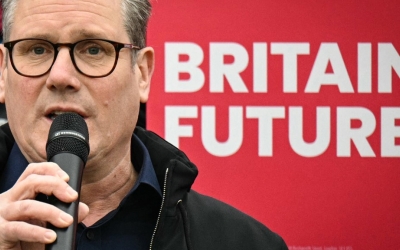UK election 2024: Keir Starmer's attack on Bangladeshis was no accident

Editor’s note: Andrew Feinstein is standing as an independent in the UK general election in the constituency of Holborn & St Pancras against Labour Party leader Keir Starmer. For a full list of other candidates standing in Holborn & St Pancras, click here.
The lengths to which Keir Starmer seems to be willing to go to win power is worrying.
I said this shortly after he made what many consider inflammatory, dog-whistle comments about the Bangladeshi community on the Sun newspaper’s recent election debate show, and I reiterate it unequivocally now.
It is not clear what motivated Starmer - the leader of the UK opposition Labour Party and the incumbent MP in a proudly ethnically diverse constituency with a large and thriving Bangladeshi community - to make public references to stopping “people coming here in the first place” and sending them “back to the countries where they come from”, before going on to single out Bangladeshis in Britain.
It is not clear, but we can reasonably infer from the Labour Party’s sharp rightward lurch and increasing use of divisive rhetoric over the past four years that it wasn’t by accident.
New MEE newsletter: Jerusalem Dispatch
Sign up to get the latest insights and analysis on Israel-Palestine, alongside Turkey Unpacked and other MEE newsletters
The political and media discourse around migrants, refugees and asylum seekers in the UK is reflective of a policy landscape that has further punished millions of the most vulnerable people on earth.
Enormous contributions to British life
Any decent human being, and especially any person seeking public office, should refrain from falling into the trap of distinguishing between "worthy" and "unworthy" migrants.
All migrants are people, and all people are worthy of safety and prosperity.
Nonetheless, Starmer’s comments very specifically mentioned the Bangladeshi community alone, and as such warrant specific rebuttals.
They also called to the surface specific forms of prejudice traditionally aimed at Britain’s Bangladeshi community that remain alive and well.
In the year to March 2024, people from Bangladesh accounted for eight of the 31,079 migrants who arrived "illegally" via small boats - a status forced on them by a cruel policy refusing migrants safe routes to the UK.
No person should be designated "illegal", but this minuscule number does seriously call into question Starmer’s choice in invoking Bangladeshi asylum seekers when 99.975 percent of people risking their lives on small boats in the English Channel come from elsewhere.
To say the British-Bangladeshi population has made enormous and innumerable contributions to British social, economic, political, professional and cultural life is an understatement.
Britain’s Bangladeshi communities are proud - and rightly so - of the degree to which they have integrated into British society while simultaneously retaining heritage and networks that have enriched us all.
Sustained, violent racism
But Starmer wasn’t just punching sideways or upwards - he was also consciously punching downwards.
For every great success Britain’s Bangladeshi population has enjoyed, it has also suffered racism and deprivation at the hands of British institutions and society.
Indeed, 67 percent of all British-Bangladeshi children grow up in poverty - the highest rate of any single ethnic group in the country. These children need the support of political leaders, not their condemnation.
Bangladeshis have also been the target of sustained, violent racism.
In May 1978, a 24-year-old Bangladeshi textile worker named Altab Ali was stabbed to death by racist thugs in London’s Tower Hamlets - an area that has provided a safe haven for people fleeing persecution and strife since the arrival of Huguenots some four centuries ago; and which, as a result, attracted a reign of terror from the National Front in the 1970s and 80s.
It is also troubling to me that in Tower Hamlets today - which houses the largest British-Bangladeshi population in the UK, and where the directly elected mayor, Lutfur Rahman, remains among the most high profile Bangladeshi politicians in the country - there seems to be yet another attempt by the central government to trample on local democracy and delegitimise the elected mayor via the mechanism of a so-called "best value inspection".
This is despite the council being a pioneer in tackling child food poverty, and managing its finances in such a way that it is one of the few to increase investment in public services, rather than cut them as so many other councils have been forced to do.
Keir Starmer will be familiar with much of this history.
As an immensely powerful public figure, he ought to know the weight of his words, and reflect on the harm they might do in the wrong hands.
The views expressed in this article belong to the author and do not necessarily reflect the editorial policy of Middle East Eye.
Middle East Eye delivers independent and unrivalled coverage and analysis of the Middle East, North Africa and beyond. To learn more about republishing this content and the associated fees, please fill out this form. More about MEE can be found here.






